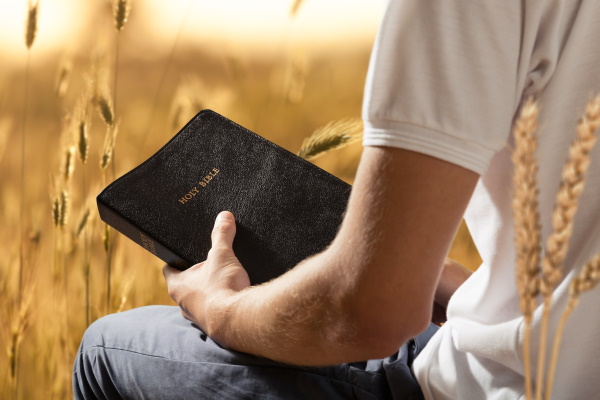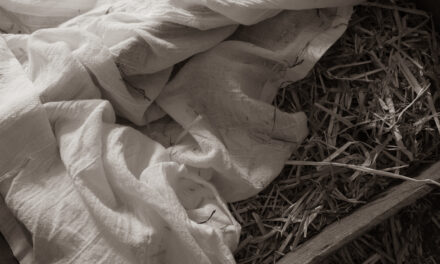White Unto Harvest
By Jim Huskins
McDowell County
“Good judgment comes from experience, and experience comes from bad judgment.”
The truth of that old saying overwhelmed me recently as I mowed beside the road that fronts our homestead. My mower worked perfectly. It was satisfying work. About halfway through, I realized that I had been attempting and failing to accomplish good results with that mower for thirty-four years.
I was using an Austrian-style scythe that I bought in 1988. A good scythe is a marvelous tool for trimming, mowing lawns, making hay, and harvesting grain. My purchase was inspired by an essay in The Gift of Good Land by Wendell Berry and by David Tresemer’s The Scythe Book. I spent decades learning that a scythe is a complex tool that requires proper equipment, precise fit, and esoteric sharpening skills. Eventually, I realized that two writers I respected had steered me in several wrong directions.
Misdirection is nothing new. Jesus spent much of His ministry confronting it. The religious leaders of His day taught a form of worship mostly based on the opinions of men rather than the content of scripture. Those leaders were revered, and they misled many. Jesus railed against their self-centered religion to the point of calling them snakes.
One of His many conversations focused on false worship is found in John chapter four. Jesus violated a number of cultural taboos when He asked a Samaritan woman for a drink. He then used water as a metaphor to discuss her spiritual health. She wanted to avoid the sordid details of her personal life, so she attempted to steer the conversation toward the differences between Jewish and Samaritan worship. Jesus told her that God seeks those who will worship Him in spirit and truth. She knew from God’s Word that Messiah has all the answers. This is the only time in the Gospel accounts when Jesus states plainly that He is Messiah.
The result of this encounter was that a woman with a bad reputation became a missionary who led her entire village to the Savior. As residents of Sychar flocked to see the One with such miraculous ability, Jesus turned to His disciples and said, “Lift up your eyes, and look on the fields; for they are white already to harvest.” (John 4:35b) His solution for this situation is found in Matthew 9:37-38, “The harvest is plentiful, but the laborers are few; therefore, pray earnestly to the Lord of the harvest to send out laborers into his harvest.”
We have been misdirected by the notion that “following Christ” is about our health, our prosperity, and our happiness. Our call is to be “laborers in His harvest.” The job requires total devotion, the right tools, and skill in their use. What we need is not found in the doctrines and traditions of men. Those are what caused Jesus to refer to the theologians of His day as a brood of vipers. The tools for His harvest are found only in His Word.
I learned through decades of poor results from my good scythe that mere possession of an excellent tool is not enough. God’s harvest requires discipleship. A “disciple” of Jesus thinks and acts as He does. Jesus made it clear that the purpose of His life was to do the will of His Father. “Whoever says he abides in him ought to walk in the same way in which he walked.” (1 John 2:6) We cannot gather God’s harvest until we have been “harvested.” Jesus quoted Moses when He said to Satan, “Man shall not live by bread alone, but by every word that comes from the mouth of God.” (Matthew 4:4) The doctrines and traditions of men say that most of God’s words were made irrelevant or “nailed to the cross.” Jesus says we live by “every word” that comes from God’s mouth. Who is more likely to be correct?
How can one know “every word that comes from the mouth of God” without reading His Word from the beginning? Any dependence on others to convey what God’s Word says will result in misdirection. Jesus tells us to love God with our entire being and to love our neighbors as ourselves. He did not tell us to have a “warm, gushy feeling” for God and our neighbors. He told us to live in a manner that places God’s requirements and our neighbor’s needs ahead of our own. The first five books of the Bible tell us how to do exactly that.
God’s harvest is dear to Him, and we can learn the skills necessary to do our part. After more than twenty years of frustration with my original scythe, and armed with a wealth of hard-won knowledge, I bought a new scythe that fit me and my needs. Since then, I’ve been able to properly maintain the tool and do good mowing. I was until recently, however, still frustrated with my original scythe.
Last year I mounted my old blade on a much better handle or snath. The new snath is a gorgeous, hand-made, steam-bent shaft of Northern Ash. It has two handles or grips placed to fit my height and arm length. This improved the scythe, but it still wasn’t right. The problem was that the mounting tang on the steel blade was set at the wrong angle for my height. The blade was hopelessly misdirected where it meets the grass. I had read that it is impossible to change that angle without damaging the blade. Recently I discovered a YouTube video showing how to heat the tang with a torch and change the angle. Now the old scythe mows perfectly.
The Great Commission of Matthew 28:19-20 is the most important work ever assigned. The holy task of gathering and training members of the Kingdom of God is given to you and me, but we cannot disciple others until we have committed our lives to God’s every word.
__________________________________________________
Jim & Beverly Huskins are members of Obedient Heart Fellowship in McDowell County. You can read more good Christian news from Jim HERE.
__________________________________________________







